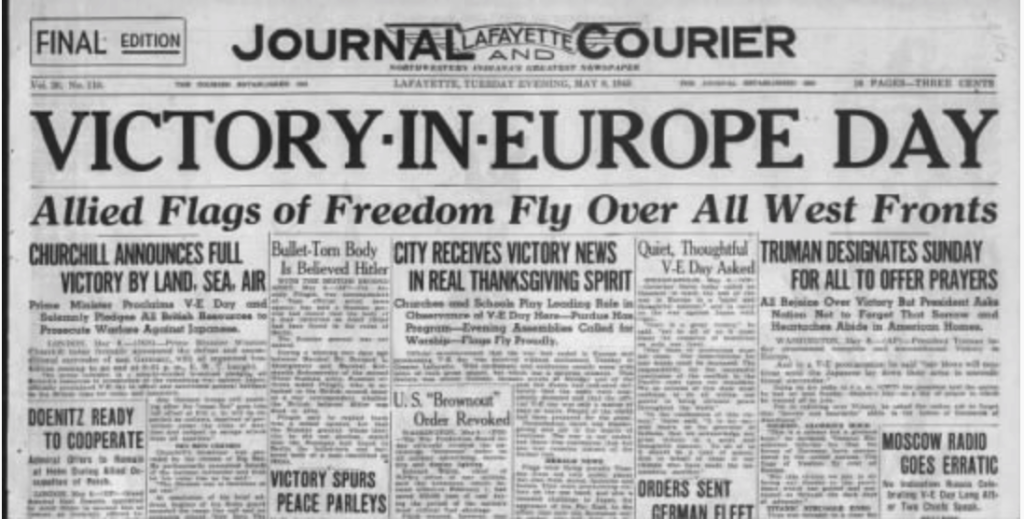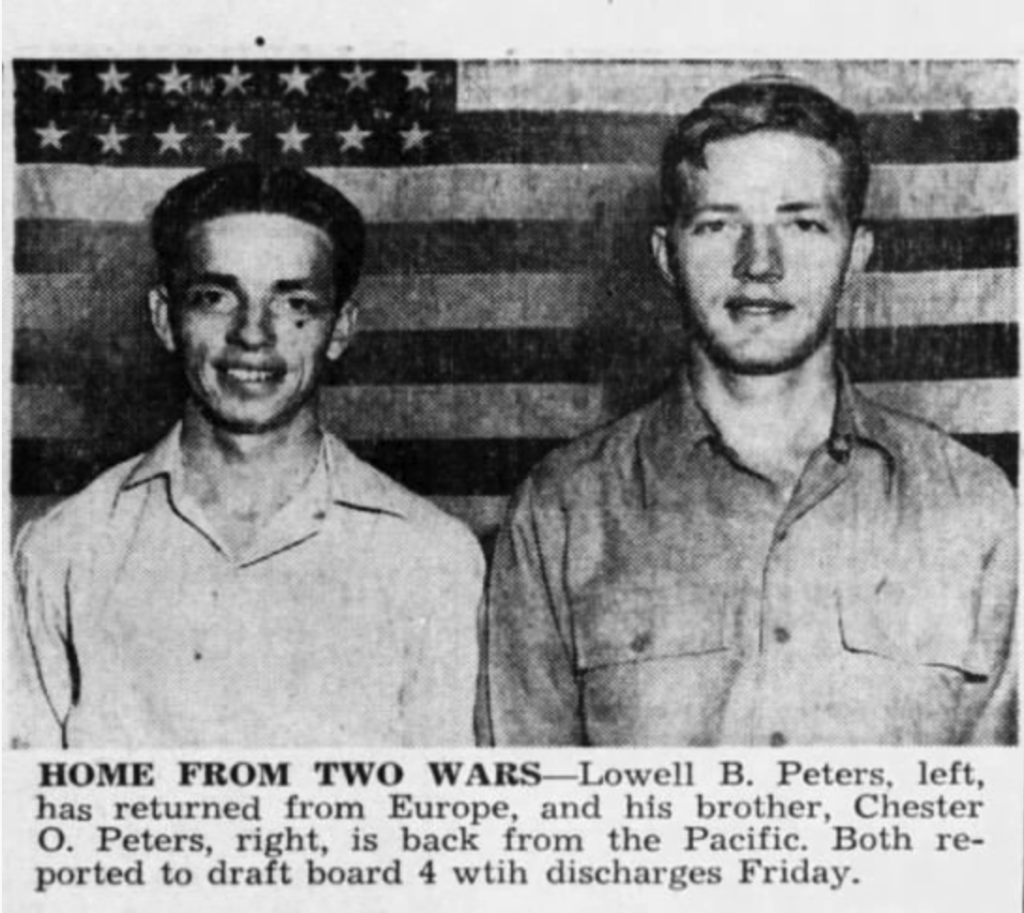On May 8th, we celebrate the 75th anniversary of V-E Day, the formal acceptance of Germany’s unconditional surrender in Europe. To honor the legacy of our WWII soldiers, we want to help you tell their story. Historical newspapers are a great way to research your WWII veteran. Here are some tips and tricks for researching your soldier’s story in Newspapers.com.

- Begin your search by name. Just enter your soldier’s name in the search tab. You can narrow the results by refining dates, locations, or keywords. Maybe the local paper ran a story about your soldier enlisting. This can provide valuable clues about which branch of the service your soldier served in. You might even learn what regiment or company he or she belonged to. Hometown newspapers often reported when a local soldier was injured or killed, home on leave, or discharged. If multiple siblings served from one family, search all names, including the parents. Newspapers often include photographs of soldiers too. If you don’t find your soldier in a name search, don’t despair, there are some other tricks!
- Search for specific battles. If you know your soldier fought in a specific battle, use that battle as your search keyword. You might not find your soldier specifically mentioned, but others provided first-hand accounts. These details can help you construct a story.
- Search by battalion, division, company, name of a Navy ship, etc. Did your soldier’s company/battalion have a famous nickname? Or do you know the name of the commanding officer? These searches can also provide valuable results. Newspapers tracked the movements of our soldiers and reported daily on skirmishes and battles. You can create a timeline of your soldier’s movements by tracking those stories.
- Search by date. If you have records showing your soldier was wounded or killed on a specific date, search for battles fought at that same time and place.
- Search by location. Do you know, for example, that your soldier was part of the Japanese occupation force? Use that in your search term. When we searched that term and filtered the dates from 1944-1947, it returned more than 300,000 search results. Do you have a Navy veteran that served in the Solomon Islands? You could search “Asiatic-Pacific Theater”. The more details you have, the more you can narrow your search.
- Personal interviews. Over the years, many of our WWII veterans have given lengthy interviews in newspapers. These first-hand narratives provide amazing insight into what our soldiers experienced. Expand your search beyond the war years, some of these soldiers didn’t share their story for decades.
- Search the names of fellow soldiers. Do you have records, photographs, or journals that mention the names of soldiers that served with your ancestor? Research those soldier’s names for more detail.
- Search post-war clubs and associations. Many soldiers joined clubs, fraternal organizations, and associations after returning from their service. For example, the American Legion changed its charter after WWII to allow returning soldiers to join its ranks.
- Search obituaries. Often the families of deceased soldiers shared details and stories of their military service in their obituaries, even decades later. Even if you are not related to this person, their obituary may shed light on your own ancestor’s service.
Preserving the story of our WWII veterans is a great way to honor their service! Please share your finds in the comments below. Get started searching your WWII veteran on Newspapers.com today!




Is the whole paper going to be shown not just a small segment. When you had your free time on April 28 you could access a portion of the search but not see the whole page without purchasing a publisher part
Are you forgetting the Army Air Corps and their roles as pilots and crewmen on B-17s, B-24s, etc.? I see you mentioned Navy ships…but the fact is that when you emphasize “soldiers,” you are minimizing the air and navy personnel roles in bringing about V-E Day.
My uncle ,Truman Young, was a glider pilot in Army Air Corp, but can find very little to go on. A cousin said he was told they were secret to not let the enemy know about their big plans
for glider drop over Rhine.
I am a subscriber but have had no luck finding my cousin LaFaye Armour who died in the Bataan death march during WWII. Can you help me?
Elaine L
If he was from Kansas, perhaps this is him? https://www.newspapers.com/image/?clipping_id=48286670&fcfToken=eyJhbGciOiJIUzI1NiIsInR5cCI6IkpXVCJ9.eyJmcmVlLXZpZXctaWQiOjM2OTU4NzEyLCJpYXQiOjE1ODg2MDU1ODksImV4cCI6MTU4ODY5MTk4OX0.4HCVEH4k7EPrn_MwJ9ZU6jjVl-JDQc7IlNAS2xanQeM
Have you read “Ghost Soldiers”? It is an incredible account of that battle, march and rescue.
Norman Welch and his brother William Welch were both in ww2, I believe they were both sailors. It would be the BEST if some one knew of them/
Cpt. Albert A. Nettles, USArmy Field Artillery, wounded in action in Northern Italy while serving as a forward artillery observer in the 88th Infantry Division. Medically evacuated to the USA initially to Thomasville, GA, later served in convalescent hospital in Datona Beach, FL where he was honorably discharged & awarded Silver Star, Bronze Star, Purple Heart, Army Commondation Medal, and other decorations.
Local newspapers also often published letters from soldiers to their families. I have found some letters written by my ancestors that provide fascinating information.
Your search bar above does not allow names to be typed in.
Sheila, sorry about the confusion. The search bar above is just an image. To search for your soldier, go to Newspapers.com or click on the Newspapers.com link above.
Your search form is inoperative. You seem to be associated with FOLD3 and their search function is worthless as well. All you seem to be doing is trying to entice people to subscribe to a paid service.
I have had no luck tracking my great uncle, Paul Miller. He was a bombardier in Operation Tidal Wave, North Africa and Italy. It seems others are having difficulty with Army Air Corps information. Any ideas?
Meron Chabluk was KIA in the liberation of Holland in February 1945. I am his son.
I am a subscriber to Fold 3 but have never put a question to them. I sent an information request to the National Archives and the only thing they found was my father’s discharge payment of $286 in Nov 1945. This was after his release from a German Prisoner of War Camp. As advised, the “fire” destroyed records. You would think prisoner of war records would have special treatment.
That is a disappointment. What outfit was he in and do you know what camp? My Uncle was captured at the Bulge with the 106th. He was at Bad Orb and Ziegenhain.